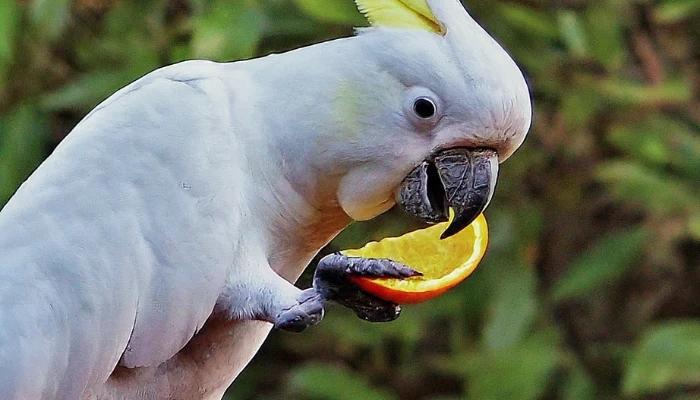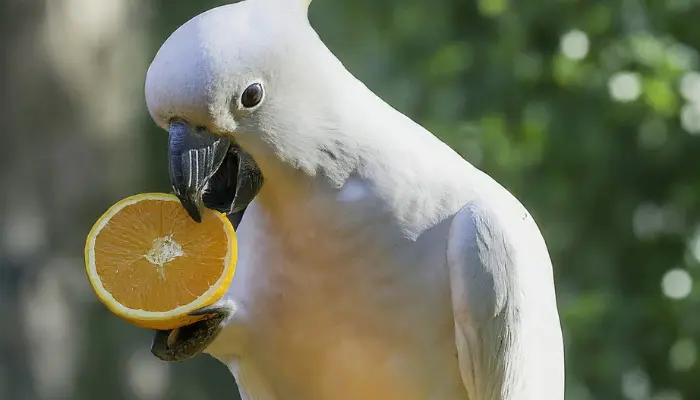Yes, cockatoos can eat oranges in moderation. Oranges are safe for most cockatoos to consume as an occasional treat due to their natural sugar content. However, it is essential to ensure that the orange pieces are fresh and free from any pesticides or other harmful substances.
Additionally, always introduce new foods gradually to monitor your cockatoo’s reaction and ensure they don’t have any adverse effects. While oranges can provide some variety in their diet, remember that the bulk of their nutrition should come from a balanced pelleted diet supplemented with fresh fruits, vegetables, and occasional treats like oranges.
Nutritional Profile of Oranges
here is a breakdown of the nutritional profile of oranges.
A. Macronutrients
- Carbohydrates: Oranges are primarily composed of carbohydrates, with a significant portion of their carbohydrate content coming from natural sugars like glucose, fructose, and sucrose.
- Proteins: Oranges contain a small amount of protein.
- Fats: Oranges are naturally low in fat.
B. Micronutrients
- Vitamins: Oranges are an excellent source of vitamin C, providing more than 100% of the recommended daily intake in just one fruit. They also contain small amounts of vitamins A, B vitamins (like thiamine, riboflavin, and folate), and vitamin E.
- Minerals: Oranges contain minerals such as potassium, calcium, magnesium, and phosphorus in smaller amounts.
C. Fiber content
Oranges are a good source of dietary fiber, particularly if consumed with the pulp. The fiber content helps with digestion and can contribute to a feeling of fullness.
D. Water content
Oranges have a high water content, making them refreshing and hydrating fruits. They are composed of approximately 87% water, which also contributes to their juicy texture.

Potential Benefits of Oranges in Cockatoos’ Diet
Oranges can be a nutritious addition to a cockatoo’s diet when given in moderation. Here are some potential benefits
- Vitamin C: Oranges are rich in vitamin C, which is essential for boosting the immune system and promoting overall health in cockatoos, just as it is in humans.
- Hydration: Oranges have a high water content, which can help keep your cockatoo hydrated, especially during warmer weather or if they are prone to dehydration.
- Antioxidants: Oranges contain various antioxidants such as flavonoids and carotenoids, which can help reduce oxidative stress and inflammation in the body.
- Dietary Fiber: Oranges are a good source of dietary fiber, which is important for maintaining digestive health and preventing constipation in cockatoos.
- Enrichment: Providing oranges as a treat can offer mental stimulation and enrichment for cockatoos through the process of peeling and eating the fruit.
However, it is essential to offer oranges in moderation and as part of a balanced diet. Too much citrus fruit can lead to digestive upset or other health issues in cockatoos. Additionally, always remove seeds and avoid feeding them the peel.
Potential Health Risks of Oranges in Cockatoos’ Diet
Feeding oranges to cockatoos can present some risks primarily due to the high acidity and natural sugars found in oranges. Here are some potential concerns.
- Digestive Issues: Cockatoos may have sensitive digestive systems, and the acidity of oranges can lead to digestive upset, including diarrhea or vomiting.
- High Sugar Content: Oranges contain natural sugars, which can be harmful to birds in large quantities. Excessive sugar consumption can lead to obesity and other health problems.
- Citrus Sensitivity: Some birds, including cockatoos, can be sensitive to citrus fruits like oranges. Citrus fruits contain compounds that can cause irritation or allergic reactions in some birds.
- Seed Toxicity: While the flesh of the orange itself isn’t toxic to birds, the seeds can be. Ingesting large quantities of seeds can lead to toxicity and other health issues.
- Nutritional Imbalance: While oranges contain some vitamins and minerals, they don’t offer a balanced diet for cockatoos. Feeding too many oranges could lead to nutritional deficiencies over time.
If you want to provide your cockatoo with a varied diet, it is best to offer a range of bird-safe fruits and vegetables in moderation. Stick to options like apples, bananas, berries, and leafy greens, and always consult with a veterinarian who specializes in avian care for specific dietary recommendations for your cockatoo.
Conclusion
Oranges can be a good addition to a cockatoo’s diet if given in moderation. They are rich in vitamin C and can help keep your bird hydrated. However, be careful because they are acidic and have sugar. Introduce oranges slowly and watch for any tummy troubles. Always remove seeds and peels before offering them to your cockatoo. It is also smart to talk to a vet who knows about bird nutrition. They can give you personalized advice to keep your cockatoo healthy and happy. So, oranges can be a treat but be cautious and keep an eye on your feathered friend.
